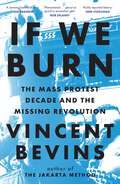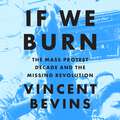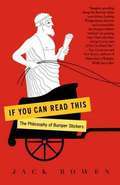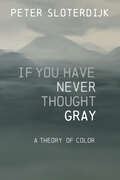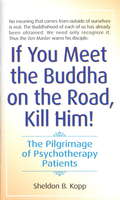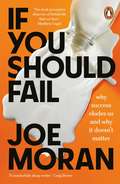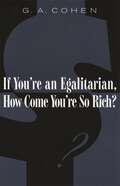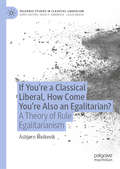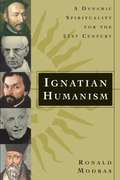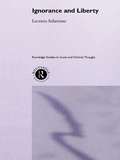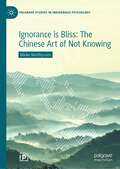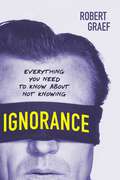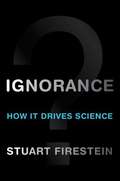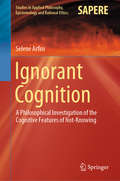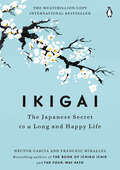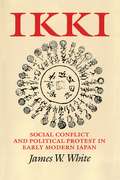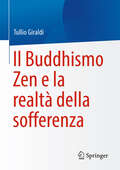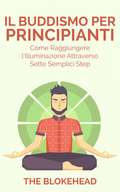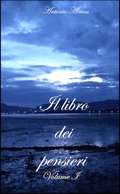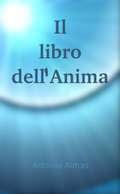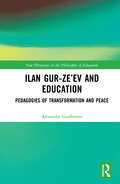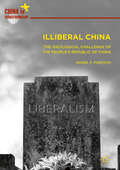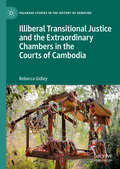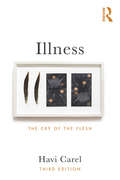- Table View
- List View
If We Burn: 'as good as journalism gets'
by Vincent BevinsThis book is phenomenal ... It's about as good as journalism gets ...The highest praise I can give If We Burn is to say that it would be criminally negligent not to read it if you'd like to change the world. - ROB DELANEY Bevins's clear-eyed, sympathetic account of the unfulfilled promise of these protests leaves his reader with a bold vision of the future. - MERVE EMREA stunning history of now. - GREG GRANDINFrom 2010 to 2020, more people took part in protests than at any other point in human history. Why has success been so elusive?From the so-called Arab Spring to Gezi Park in Turkey, from Ukraine's Euromaidan to student rebellions in Chile and Hong Kong, the second decade of the twenty-first century was propelled by explosive mass demonstrations. But few people got what they wanted. In too many cases, the protests led to the opposite of what they asked for.If We Burn is a stirring work of global history built around that strange but fundamental paradox. Acclaimed journalist Vincent Bevins interviewed hundreds of people around the world, and weaves their insights and recollections into a fast-paced, gripping narrative. We follow his own troubling experiences in Brazil, where a protest movement ignited by leftists and anarchists led to an extreme-right government that torched the Amazon.In the mass protest decade, humanity demonstrated a deep desire for change, and brave individuals started something that has been left unfinished. In this ground-breaking study of an extraordinary chain of events, protesters and major actors offer urgent lessons for those who wish to understand geopolitics today, and create a better world tomorrow.
If We Burn: 'as good as journalism gets' - Rob Delaney
by Vincent BevinsFrom 2010 to 2020, more people took part in protests than at any other point in human history. Why has success been so elusive?From the so-called Arab Spring to Gezi Park in Turkey, from Ukraine's Euromaidan to student rebellions in Chile and Hong Kong, the second decade of the twenty-first century was propelled by explosive mass demonstrations. But few people got what they wanted. In too many cases, the protests led to the opposite of what they asked for.If We Burn is a stirring work of global history built around that strange but fundamental paradox. Acclaimed journalist Vincent Bevins interviewed hundreds of people around the world, and weaves their insights and recollections into a fast-paced, gripping narrative. We follow his own troubling experiences in Brazil, where a protest movement ignited by leftists and anarchists led to an extreme-right government that torched the Amazon.In the mass protest decade, humanity demonstrated a deep desire for change, and brave individuals started something that has been left unfinished. In this ground-breaking study of an extraordinary chain of events, protesters and major actors offer urgent lessons for those who wish to understand geopolitics today, and create a better world tomorrow.(P) 2023 Hachette Book Group
If You Can Read This: The Philosophy of Bumper Stickers
by Jack BowenMixing pop culture with the ideas of historically prominent philosophers and scientists, "If You Can Read This" exposes the deeper wisdom couched behind bumper sticker slogans.
If You Have Never Thought Gray: A Theory of Color
by Peter Sloterdijk“You’re not a painter if you haven’t painted gray”, declared Paul Cézanne. The same could be said of philosophers: you’re not a philosopher if you have never thought gray. This simple four-letter word signifies much more than a quasi-neutral color lying between black and white: we use the same word to describe moods, November skies, the hair of the elderly, the withered features of faces, dusty shelves, faceless bureaucracies, dreary politicians and hundreds of other things. This plain, unassuming word conceals a multitude of thoughts that we seldom pause to consider. In this exceptionally original book, Peter Sloterdijk follows the grey thread through the history of philosophy, art, literature and politics, enabling us to see familiar things in new ways and highlighting features of our lives that would otherwise remain unseen. Beginning with Plato’s allegory of the cave which introduced the concept of gray into thought, Sloterdijk unfolds a chiaroscuro narrative which recognizes the power of grey as a metaphor for the indefinite, the indifferent, the ordinary, the intermediate and the neutralizing. We see the invention of photography and monochrome’s journey through modern art – from Malevich’s Black Square to Richter’s grey panel paintings – in a new light, and we see modern states and modern politics as full of grey zones, from the hidden spheres of the security services to the extraterritorial spaces that harbor illegal activities like money laundering and the drug trade. A work of brilliance by one of the most creative philosophers writing today, If You Have Never Thought Gray will appeal to a wide readership interested in philosophy, art and politics, and to students and academics in philosophy, visual arts and the humanities generally.
If You Meet the Buddha on the Road, Kill Him: The Pilgrimage Of Psychotherapy Patients
by Sheldon KoppTherapists do not and cannot give answers. Explore the true nature of the therapeutic relationship, and realize that the guru is no Buddha. He is just another human struggling. Understanding the shape of your own personal ills will lead you on your journey to recovery. Sheldon Kopp has a realistic approach to altering one's destiny and accepting the responsibility that grows with freedom.
If You Should Fail: A Book of Solace
by Joe Moran'There is an honesty and a clarity in Joe Moran's book If You Should Fail that normalises and softens the usual blows of life that enables us to accept and live with them rather than be diminished/wounded by them' Julia Samuel, author of Grief Works and This Too Shall Pass 'Full of wise insight and honesty. Moran manages to be funny, erudite and kindly: a rare - and compelling - combination. This is the essential antidote to a culture obsessed with success. Read it' Madeleine BuntingFailure is the small print in life's terms and conditions.Covering everything from examination dreams to fourth-placed Olympians, If You Should Fail is about how modern life, in a world of self-advertised success, makes us feel like failures, frauds and imposters. Widely acclaimed observer of daily life Joe Moran is here not to tell you that everything will be all right in the end, but to reassure you that failure is an occupational hazard of being human. As Moran shows, even the supremely gifted Leonardo da Vinci could be seen as a failure. Most artists, writers, sports stars and business people face failure. We all will, and can learn how to live with it. To echo Virginia Woolf, beauty "is only got by the failure to get it . . . by facing what must be humiliation - the things one can't do."Combining philosophy, psychology, history and literature, Moran's ultimately upbeat reflections on being human, and his critique of how we live now, offers comfort, hope - and solace. For we need to see that not every failure can be made into a success - and that's OK.
If You're an Egalitarian, How Come You’re So Rich?
by G. A. CohenThis book presents G. A. Cohen's Gifford Lectures, delivered at the University of Edinburgh in 1996. Focusing on Marxism and Rawlsian liberalism, Cohen draws a connection between these thought systems and the choices that shape a person's life. In the case of Marxism, the relevant life is his own: a communist upbringing in the 1940s in Montreal, which induced a belief in a strongly socialist egalitarian doctrine. The narrative of Cohen's reckoning with that inheritance develops through a series of sophisticated engagements with the central questions of social and political philosophy. In the case of Rawlsian doctrine, Cohen looks to people's lives in general. He argues that egalitarian justice is not only, as Rawlsian liberalism teaches, a matter of rules that define the structure of society, but also a matter of personal attitude and choice. Personal attitude and choice are, moreover, the stuff of which social structure itself is made. Those truths have not informed political philosophy as much as they should, and Cohen's focus on them brings political philosophy closer to moral philosophy, and to the Judeo-Christian ethical tradition, than it has recently been.
If You’re a Classical Liberal, How Come You’re Also an Egalitarian?: A Theory of Rule Egalitarianism (Palgrave Studies in Classical Liberalism)
by Åsbjørn MelkevikClassical liberalism has wrongly been regarded as an ideology that rejects the welfare state. In this book, Åsbjørn Melkevik corrects this common reading of the classical liberal tradition by introducing a theory of “rule egalitarianism”. Not only is classical liberalism compatible with social justice, but it can also help us understand why some egalitarian endeavours are an essential feature of a market society. If a necessary link exists between the classical liberal tradition and the moral and institutional dimensions of the rule of law, then this tradition is bound to uphold a substantial form of social justice. Coherence requires that classical liberals like Friedrich Hayek and Milton Friedman adopt an authentic egalitarian program. They should ameliorate poverty and limit inequality not merely out of prudence or collective self-interest, but for the natural justice of ongoing social cooperation as well as for the impartiality of market institutions.
Ignatian Humanism: A Dynamic Spirituality for the Twenty-First Century
by Ronald Modras<p>Ignatius Loyola, founder of the Jesuit order, is one of a mere handful of individuals who has permanently changed the way we understand God. In this vividly written and meticulously researched book, Ronald Modras shows how Ignatian spirituality retains extraordinary vigor and relevance nearly five centuries after Loyola’s death. At its heart, Ignatian spirituality is a humanism that defends human rights, prizes learning from other cultures, seeks common ground between science and religion, struggles for justice, and honors a God who is actively at work in creation. <p>The towering achievements of the Jesuits are made tangible by Modras’s vivid portraits of Ignatius and five of his successors: Matteo Ricci, the first Westerner at the court of the Chinese emperor; Friederich Spee, who defended women accused of witchcraft; Karl Rahner, the greatest Catholic theologian of the twentieth century; Pierre Teilhard de Chardin, the scientist-mystic; and Pedro Arrupe, the charismatic leader of the Jesuits in the years following Vatican II.</p>
Ignorance and Bliss: On Wanting Not to Know
by Mark LillWe want to know, we want not to know. We accept truth, we resist truth. Back and forth the mind shuttles, playing badminton with itself. But it doesn't feel like a game. It feels as if our lives are at stake. And they are. Aristotle claimed that "all human beings want to know." Our own experience proves that all human beings also want not to know. Today, centuries after the Enlightenment, mesmerized crowds still follow preposterous prophets, irrational rumors trigger fanatical acts, and magical thinking crowds out common sense and expertise. Why is this? Where does this will to ignorance come from, and how does it continue to shape our lives? In Ignorance and Bliss, the acclaimed essayist and historian of ideas Mark Lilla offers an absorbing psychological diagnosis of the human will not to know. With erudition and brio, Lilia ranges from the Book of Genesis and Plato's dialogues to Sufi parables and Sigmund Freud, revealing the paradoxes of hiding truth from ourselves. He also exposes the fantasies this impulse leads us to entertain--the illusion that the ecstasies of prophets, mystics, and holy fools offer access to esoteric truths; the illusion of children's lamblike innocence; and the nostalgic illusion of recapturing the glories of vanished and allegedly purer civilizations. The result is a highly original meditation that invites readers to consider their own deep-seated impulses and taboos.
Ignorance and Liberty (Routledge Studies in Social and Political Thought)
by Lorenzo InfantinoThose with a belief in open society base the demand for liberty on the recognition of human ignorance; we need to be free because we are ignorant and fallible. Free social cooperation permits us to mobilize our knowledge and develop methods of discovery through which we can explore the unknown and continually correct our errors. To assent to free cooperation is to accept critical discussion, democracy and the market and in this way we are able to increase our rationality and further political and economic development. Improvement in the conditions of our lives, therefore, does not come from the omniscience attributed to some enlightened legislator or planner. Ignorance and Liberty examines how the market is a place which liberates us from this idea of a privileged source of knowledge. The market is not only a place where goods are exchanged but also where different philosophical ideas and religious beliefs must co-habit, opening up new horizons and undermining the sense of an absolute that prevails in a closed world.
Ignorance is Bliss: The Chinese Art of Not Knowing (Palgrave Studies in Indigenous Psychology)
by Mieke MatthyssenThis book examines the popular, yet puzzling, Chinese saying Nande hutu 难得糊涂 to uncover how the ancient Chinese wisdom of not knowing is constructed, interpreted, practiced and valued in contemporary society.Originating in the calligraphy of Qing-dynasty scholar Zheng Banqiao, Nande hutu translates literally as: “hard to attain muddle-headedness”. Mieke Matthyssen traces the historical development of this saying and related philosophies to reveal a culturally conditioned, multi-layered inclination to different forms of not knowing. In contemporary society, she argues, this inclination forms part of a living art: in some respects, a passive, evasive strategy for self-preservation; in other respects, a strategy for coping with intrapersonal, interpersonal and social complexities. Drawing on an extensive range of primary sources and original research, the analysis skillfully combines philosophical and socio-historical analysis with theory from Chinese philosophy, philosophical psychology and the relatively new field of indigenous psychology, to provide an in-depth understanding of how Nande hutu has shaped, and continues to shape, the Chinese psyche and behaviour. This book will appeal to all readers looking for fresh insights into Chinese culture, and in particular to students and scholars of Chinese and Asian studies, cultural and social anthropology, and philosophical and indigenous psychology.
Ignorance: Everything You Need to Know about Not Knowing
by Robert GraefSums up the many fields of study where ignorance can undermine our understanding, while showing how an awareness of ignorance can lead to exploration and the discovery of new knowledge. The flip side of knowledge is ignorance. This book explores the vast scope of ignorance, even in an age when we think we know more than ever before. By marking off this ocean of ignorance into manageable categories, the author provides a kind of navigational chart to the unknown, and a series of red flags to all those who claim certitude. The book first lays out the many branches of ignorance—in education, the media, politics, religion, science, and other major institutions. It then assesses the costs and consequences of that ignorance. World conflicts, endemic poverty, environmental damage, waste, racism, and the manipulative forces of industry and politics that use propaganda to manipulate the public may all be seen as rooted in ignorance. But there are positive aspects of ignorance as well. Scientists and artists, by recognizing what they don't know, are spurred on to new creative approaches and discoveries, which would never be found by those too comfortable with the tried and true. The author cites Socrates, whom the Delphic Oracle declared to be the wisest of all people simply because he realized how much he didn't know. This book gives you ways to follow in the path that Socrates forged, to counter the closed minds whose false sense of certainty cannot help but distort reality, and to be better prepared to take on even the most serious challenges of today.
Ignorance: How It Drives Science
by Stuart FiresteinIn this book, Stuart Firestein argues that ignorance, not knowledge, is what drives science. He Provides a fascinating inside-view of the way every-day science is actually done and features intriguing case histories of how individual scientists use ignorance to direct their research.
Ignorant Cognition: A Philosophical Investigation of the Cognitive Features of Not-Knowing (Studies in Applied Philosophy, Epistemology and Rational Ethics #46)
by Selene ArfiniThis book offers a comprehensive philosophical investigation of ignorance. Using a set of cognitive tools and models, it discusses features that can describe a state of ignorance if linked to a particular type of cognition affecting the agent’s social behavior, belief system, and inferential capacity. The author defines ignorance as a cognitive condition that can be either passively (and unconsciously) borne by an agent or actively nurtured by him or her, and a condition that entails epistemic limitations (which can be any lack of knowledge, belief, information or data) that affect the agent’s behavior, belief system, and inferential capacity.The author subsequently describes the ephemeral nature of ignorance, its tenacity in the development of human inferential and cognitive performance, and the possibility of sharing ignorance among human agents within the social dimension. By combining previous frameworks such as the naturalization of logic, the eco-cognitive perspective in philosophy and concepts from Peircean epistemology, and adding original ideas derived from the author’s own research and reflections, the book develops a new cognitive framework to help understand the nature of ignorance and its influence on the human condition.
Ikigai: The Japanese Secret to a Long and Happy Life
by Francesc Miralles Héctor GarcíaBring meaning and joy to all your days with this internationally bestselling guide to the Japanese concept of ikigai—the happiness of always being busy—as revealed by the daily habits of the world’s longest-living people.“If hygge is the art of doing nothing, ikigai is the art of doing something—and doing it with supreme focus and joy.” —New York Post “Only staying active will make you want to live a hundred years.” —Japanese proverb According to the Japanese, everyone has an ikigai—a reason for living. And according to the residents of the Japanese village with the world’s longest-living people, finding it is the key to a happier and longer life. Having a strong sense of ikigai—the place where passion, mission, vocation, and profession intersect—means that each day is infused with meaning. It’s the reason we get up in the morning. It’s also the reason many Japanese never really retire (in fact there’s no word in Japanese that means retire in the sense it does in English): They remain active and work at what they enjoy, because they’ve found a real purpose in life—the happiness of always being busy. In researching this book, the authors interviewed the residents of the Japanese village with the highest percentage of 100-year-olds—one of the world’s Blue Zones. Ikigai reveals the secrets to their longevity and happiness: how they eat, how they move, how they work, how they foster collaboration and community, and—their best-kept secret—how they find the ikigai that brings satisfaction to their lives. And it provides practical tools to help you discover your own ikigai. Because who doesn’t want to find happiness in every day?
Ikki: Social Conflict and Political Protest in Early Modern Japan
by James W. WhiteThe reign of the Tokugawa shoguns was a time of statebuilding and cultural transformation, but it was also a period of ikki: peasant rebellion. James W. White reconstructs the pattern of social conflict in early modern Japan, both among common people and between the populace and the government. Ikki is the first book to cover popular protest in all regions of Japan and to encompass nearly three centuries of history, from the beginnings of the Tokugawa shogunate in the 1590s to the Meiji restoration. White applies contemporary sociological theory to evidence previously unavailable in English. He draws on the long historical record of peasant uprisings, using narrative interpretation and sophisticated quantitative analysis. By linking the texture of conflict to the political and economic regime the shoguns created, he casts doubt on competing interpretations of a contained, orderly society.
Il Buddhismo Zen e la realtà della sofferenza
by Tullio GiraldiQuesto libro postula che gli approcci occidentali della psichiatria e del cognitivismo non affrontano la varietà di fattori coinvolti nella sofferenza mentale esistenziale, mostra come le pratiche e i principi Buddhisti potrebbero contribuire al superamento dei limiti meccanicistici della psichiatria e delle terapie cognitivo comportamentali, ed esplora come il Buddhismo abbia svolto un ruolo nei tentativi sia Orientali che Occidentali di alleviare la sofferenza mentale. Offre una guida accessibile al ruolo che lo Zen ha svolto e, insieme al Buddhismo, potrebbe svolgere per alleviare la sofferenza mentale di natura esistenziale. Fin dai suoi inizi, 2500 anni fa, la convinzione centrale del Buddhismo è stata che ciò che percepiamo come "realtà" ne è una rappresentazione mentale, e questa visione è stata sostanziata dall'evidenza delle moderne neuroscienze. Il lavoro e il progresso della medicina, della psichiatria e della psicologia hanno tentato di alleviare le sofferenze della vita, ma allo stesso tempo gli attuali approcci alla salute mentale in psichiatria, nelle neuroscienze e nel cognitivismo non affrontano pienamente la complessità e l'interrelazione reciproca della varietà di fattori coinvolti nella sofferenza mentale. Il Buddhismo Zen, d'altra parte, incoraggia un accesso diretto alla realtà interna ed esterna non mediato dalle esperienze del sé, e quindi questo libro si sforzerà di esplorerà, rigorosamente, i modi in cui i suoi principi guida possono essere utilizzati per sostenere e migliorare le soluzioni cliniche occidentali alla sofferenza mentale.
Il Buddismo per principianti. Come raggiungere l'Illuminazione attraverso sette semplici step.
by The BlokeheadIl Buddismo in parole semplici - La tua vita cambierà veramente Ti senti stressato e sopraffatto dalla quotidianità? Vorresti raggiungere una nuova consapevolezza e sentirti finalmente in pace? Ecco la soluzione: il Buddismo per principianti; i sette semplici passaggi che conducono all'Illuminazione. Questo libro ti mostrerà come risvegliare la tua mente e fare del Buddismo uno stile di vita. Tra i passaggi più importanti di questo libro troverai: -la comprensione delle Quattro Nobili Verità -la comprensione del Nobile Sentiero (e altri sentieri verso l'Illuminazione) -l'accettazione -il lasciar andare (la non identificazione) - e molto altro
Il libro dei pensieri
by Antonio AlmasPer chi ha desiderio di riflettere, pensare ed immergersi nelle onde dell’amore, ecco il libro adatto. Brevi pensieri dell’autore, adatte ad ogni momento, e di facile immedesimazione.
Il libro dell'Anima
by Antonio Almas Monja ArenielloLa poesia non riguarda solo la fonetica, dove le parole devono fare rima e le frasi hanno una struttura rigorosa. La poesia è tutta una questione di sensi, in cui ogni frase è come un attore che recita una scena, per un pubblico affamato di sentimenti. Il segreto di questa rappresentazione è di stimolare l'immaginazione del lettore, in modo da permettergli di disegnare ogni scenario nella dimensione dei suoi sogni. Veramente, la poesia è la capacità di creare nuovi universi.
Ilan Gur-Ze’ev and Education: Pedagogies of Transformation and Peace (New Directions in the Philosophy of Education)
by Alexandre GuilhermeIlan Gur-Ze'ev and Education: Pedagogies of Transformation and Peace critically analyses and introduces the main ideas of Ilan Gur-Ze’ev, reflecting on his continuing theoretical and practical relevance to the field of education. This book offers an accessible, higher-level critical discussion on the thought of Ilan Gur-Ze'ev with an impressive breadth and contemporary focus. The book focuses on Gur-Ze'ev's 'counter-pedagogy' project, which brought him much attention and attempts to establish an alternative and non-dogmatic form of education. Gur Ze'ev's views go against 'critical pedagogy' and 'neoliberalism', because while the former advocates achieving a utopia in which there is no oppression, the latter defends the idea that 'wants and desires' need to be satisfied through a process of 'marketisation'. This book brings to notice Gur-Ze’ev’s concepts of ‘counter-education’ and 'diasporic education' which seek to pursue the truth in everyday life, rather than achieving a utopian goal, or the promised land. This unique and up-to-date monograph will be of great interest for researchers, academics, and postgraduate students in the fields of philosophy of education, theory of education, peace education, Jewish education, neoliberalism, and sociology of education.
Illiberal China: The Ideological Challenge of the People's Republic of China (China in Transformation)
by Daniel F. VukovichThis book analyzes the 'intellectual political culture' of post-Tiananmen China in comparison to and in conflict with liberalism inside and outside the P.R.C. How do mainland politics and discourses challenge ‘our’ own, chiefly liberal and anti-‘statist’ political frameworks? To what extent is China paradoxically intertwined with a liberal economism? How can one understand its general refusal of liberalism, as well as its frequent, direct responses to electoral democracy, universalism, Western media, and other normative forces? Vukovich argues that the Party-state poses a challenge to our understandings of politics, globalization, and even progress. To be illiberal is not necessarily to be reactionary and vulgar but, more interestingly, to be anti-liberal and to seek alternatives to a degraded liberalism. In this way Chinese politics illuminate the global conjuncture, and may have lessons in otherwise bleak times.
Illiberal Transitional Justice and the Extraordinary Chambers in the Courts of Cambodia (Palgrave Studies in the History of Genocide)
by Rebecca GidleyThis book examines the creation and operation of the Extraordinary Chambers in the Courts of Cambodia (ECCC), which is a hybrid domestic/international tribunal tasked with putting senior leaders of the Khmer Rouge on trial. It argues that the ECCC should be considered an example of illiberal transitional justice, where the language of procedure is strongly adhered to but political considerations often rule in reality. The Cambodian government spent nearly two decades addressing the Khmer Rouge past, and shaping its preferred narrative, before the involvement of the United Nations. It was a further six years of negotiations between the Cambodian government and the United Nations that determined the unique hybrid structure of the ECCC. Over more than a decade in operation, and with three people convicted, the ECCC has not contributed to the positive goals expected of transitional justice mechanisms. Through the Cambodian example, this book challenges existing assumptions and analyses of transitional justice to create a more nuanced understanding of how and why transitional justice mechanisms are employed.
Illness: The Cry of the Flesh (Philosophie Concrete Ser.)
by Havi CarelWhat is illness? Is it a physiological dysfunction, a social label, or a way of experiencing the world? How do the physical, social, and emotional worlds of a person change when they become ill? Can there be well-being within illness? In this remarkable and thought-provoking book, Havi Carel explores these questions by weaving together the personal story of her own illness with insights and reflections drawn from her work as a philosopher. Carel’s fresh approach to illness raises some uncomfortable questions about how we all – whether healthcare professionals or not – view the ill, challenging us to become more thoughtful. Illness unravels the tension between the universality of illness and its intensely private, often lonely, nature. It offers a new way of looking at a matter that affects every one of us. Revised and updated throughout, the third edition of this groundbreaking volume includes a new chapter on organ transplantation. Illness: The Cry of the Flesh will prove essential reading to those studying philosophy, medical ethics, and medical anthropology, as well as those in the healthcare and medical professions. It will also be of interest to individuals who live with illness, and their friends and families.
